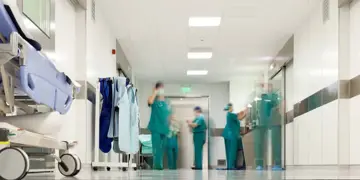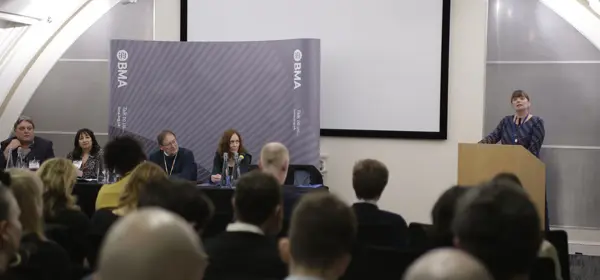PAs and AAs should be called ‘assistants’ and not see undifferentiated patients
PAs and AAs should be called ‘assistants’ and not see undifferentiated patients
Recommendations in Leng Review, which BMA calls ‘inadequate response’ to ‘patient safety scandal’
PAs, (physician associates) and AAs (anaesthesia associates) should be renamed ‘assistants’ and not see or treat undifferentiated patients, a review into their safety and effectiveness has found.
The independent Leng review, led by Professor Gillian Leng, published its findings today in what the BMA has called an ‘inadequate response’ to ‘a patient safety scandal’.
Prof Leng concluded roles were introduced without sufficient evidence of the safety of these associate roles, with no attempt at a national level to integrate the roles safely.
The BMA said this showed a ‘catastrophic failure in NHS leadership’, which put patients at risk of harm through the blurring of lines between doctors and non-doctors.
The report recommends professional standards for doctors and associates should be ‘presented separately to reinforce and clarify the differences in roles from those of doctors’, something the BMA called for when it challenged the GMC in the High Court earlier this year.
Clear structure needed
It also recommends PAs work in a ‘clear team structure, led by a senior clinician’, and have a named doctor as their formal line manager – and that clothing, lanyards, badges and staff information should distinguish PAs from doctors.
Prof Leng, however, did not recommend a nationally agreed scope of practice, as suggested by the BMA, which set out its own guidance for a scope of practice for associate roles in response to patient safety concerns.
The association says that not recommending a national scope of practice for associate roles means Prof Leng has ‘ignored the most urgent demand of the medical profession’. In April, the BMA published more than 600 reports of serious concerns submitted to the BMA by doctors and medical students who have witnessed unacceptable blurring of lines between doctors and non-doctors, which it submitted to the review.
The association called for the Government to ‘go beyond’ the recommendations in the report, which it called ‘an inadequate response to what is a patient safety scandal’ despite some ‘helpful recommendations’.
Responding to the publication, BMA council chair Tom Dolphin said: ‘Professor Leng has laid bare the catastrophic failures in NHS leadership that have put patients at serious risk of harm. But unfortunately, this review’s recommendations do not adequately protect patients.
‘Professor Leng has succeeded in exposing how NHS England introduced these roles and encouraged their expansion without any robust evidence of their safety. The report reveals inadequate national leadership, no accountability and no attempt to listen to the concerns raised by doctors, patients and coroners. The blurring of lines between doctors and non-doctors, aided and abetted by the GMC, has been an unfolding disaster for all to see, and many doctors today will be relieved to see that they were right to raise the alarm.
‘Unfortunately, while the diagnosis is strong, the prescription fails to meet the urgency of the moment. Despite the alarming way these roles were introduced and expanded unsafely there are significant gaps in the report where strong patient safety recommendations should have appeared.
‘Most worryingly, a major opportunity has been missed to end the postcode lottery of what PAs can and can’t do. By failing to recommend authoritative, nationally agreed scopes of practice, Professor Leng has ignored the most urgent demand of the medical profession and left patients at the mercy of local decisions by employers who can still choose where and how assistants can work.
Doctors will look back at this report as a moment when historic failures could have been addressed and patients finally protected – but sadly will see this as an inadequate response to what is a patient safety scandal
Tom Dolphin, BMA council chair
‘This is deeply disappointing, and we call again on NHS England to act now and adopt the BMA’s safe scope of practice guidance as an interim measure until this can be properly addressed. The GMC too must urgently act on Prof Leng’s criticisms about how its decisions are blurring the lines between doctors and assistants.
‘There are some helpful recommendations. It is good to see that our longstanding call to change the job title to “assistant” has been listened to. It should not have needed a report like this to tell NHS leaders that the title “physician associate” is confusing and misleading for patients. We urge Government and employers not to waste any time in making this change from associate to assistant.
‘Despite correctly recommending that assistants shouldn’t be the first person seeing patients coming straight through the doors in GP practices or in [emergency departments], the report then contradicts itself by saying PAs can act as a first point of contact in primary care for minor and common conditions. It is not clear how these two recommendations can coexist, and this must be urgently clarified. Minor complaints are only minor in retrospect and serious conditions can present in subtle or unusual ways.
‘No doubt doctors will look back at this report as a moment when historic failures could have been addressed and patients finally protected – but sadly will see this as an inadequate response to what is a patient safety scandal. We hope that the Government will follow our advice beyond what this report has recommended, for the sake of patients.’
Other recommendations
The report made 18 recommendations in total.
Others included PAs and AAs being able to carry out continuing training, which could lead to PAs becoming an ‘advanced physician assistant’ and having added responsibilities such as prescribing and ordering non-ionising radiation.
Prof Leng recommended PAs gain at least two years’ experience before working in primary care or mental health. She also recommended permanent faculties be established to provide professional leadership for PAs and AAs.
She recommended AAs work in the boundaries set in the interim scope of practice published by the Royal College of Anaesthetists.
And there should be a continuing national audit of safety outcomes to provide assurance of the safety of the AAs.
Prof Leng recommended doctors should receive management training, that Department of Health and Social Care should establish a working group to set out multidisciplinary models of working in different settings, and that safety systems should routinely collect information on staff groups to facilitate monitoring and interrogation at a national level.
The contrast between the training of doctors and the training of PAs and AAs is undoubtedly one of the reasons why the debate has become so impassioned
Prof Gillian Leng
In her foreword to the report, Prof Leng says the ‘passion’ of resident doctors ‘is partly why the debate has become so prominent’.
She says: ‘In listening to residents, I was struck by the fundamentally unsatisfactory way in which postgraduate doctors are now trained.’
And adds: ‘The contrast between the training of doctors and the training of PAs and AAs is undoubtedly one of the reasons why the debate has become so impassioned.’
Noting how PAs and AAs have ‘sometimes been used to fill roles designed for doctors’, Prof Leng says the rationale for doing so is ‘unclear’ and suggests a ‘reconfiguration of roles’ might be more appropriate than a ‘simplistic replacement of a doctor’.
She says her recommendations offered a ‘pragmatic solution that aims to being cohesion and clarity’, adding: ‘They won’t be universally popular, but we must now close the debate and move forward constructively, focusing on excellent teamwork and delivering world-leading patient care.’




